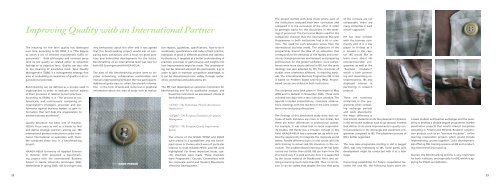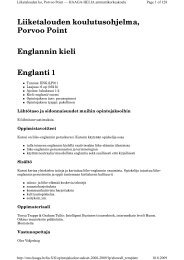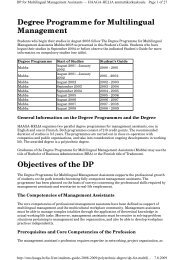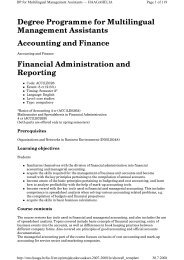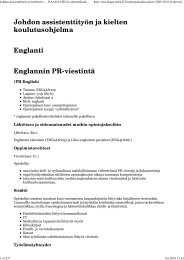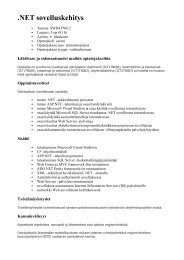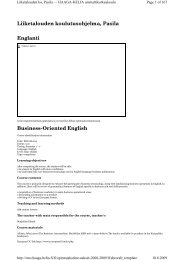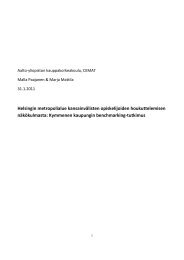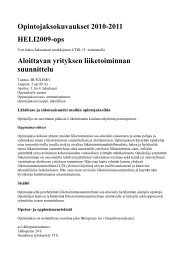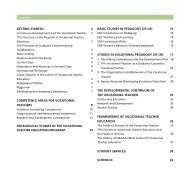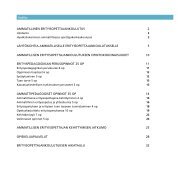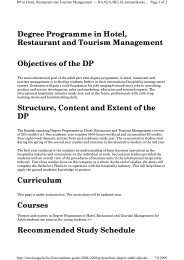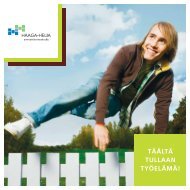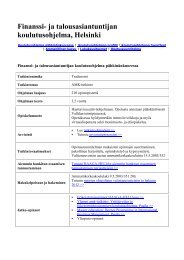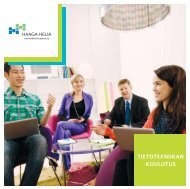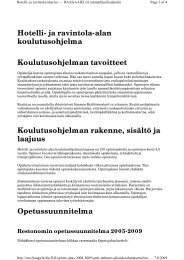Muutoksen mestarit - HAAGA-HELIA ammattikorkeakoulu
Muutoksen mestarit - HAAGA-HELIA ammattikorkeakoulu
Muutoksen mestarit - HAAGA-HELIA ammattikorkeakoulu
Create successful ePaper yourself
Turn your PDF publications into a flip-book with our unique Google optimized e-Paper software.
Improving Quality with an International Partner<br />
The meaning for the term quality has developed<br />
over time. According to ISO 9000, it is “The Degree<br />
to which a set of inherent characteristic fulfils requirements”.<br />
Both philosophy and common sense<br />
tend to see quality as related either to subjective<br />
feelings or to objective facts. Quality can also refer<br />
to the meaning of excellence itself. Total Quality<br />
Management (TQM) is a management strategy that<br />
aims at embedding an awareness of quality in all organizational<br />
processes.<br />
Benchmarking can be defined as a process used in<br />
organizations in order to evaluate various aspects<br />
of their processes in relation to best practices.<br />
According to EFQM, it is “The process of systematically<br />
and continuously comparing an<br />
organization’s strategies, processes and performance<br />
against business leaders to gain information<br />
that will help the organization to<br />
achieve business excellence”.<br />
Quality assurance has been one of <strong>HAAGA</strong>-<br />
<strong>HELIA</strong>’s focus areas as well as a means to find<br />
and define strategic partners among our 180<br />
international partner institutions in order toenhance<br />
international co-operation with them.<br />
We combined these two in a benchmarking<br />
project.<br />
<strong>HAAGA</strong>-<strong>HELIA</strong> University of Applied Sciences<br />
in Helsinki (HH) proposed a benchmarking<br />
project with the International Business<br />
School in Hanze University Groningen (IBS),<br />
Netherlands in spring 2006. IBS Groningen was<br />
very enthusiastic about this offer and it was agreed<br />
that this benchmarking project would aim at comparing<br />
both institutions with a focus on good practices<br />
and interesting developments for the future.<br />
Benchmarking at an international level was new for<br />
both IBS Groningen and <strong>HAAGA</strong>-<strong>HELIA</strong>.<br />
TEXT ANNE PERKIÖ<br />
The aims of this benchmarking project were to improve<br />
networking, collaborative relationships and<br />
mutual understanding between the two participants.<br />
Additional goals were to collect benchmark information<br />
- in the form of texts and numerical or graphical<br />
information about the area of study such as evaluative<br />
reports, guidelines, specifications, how-to-do-it<br />
workbooks, specifications and codes of best practice,<br />
exemplars of good or different practices and statistics.<br />
Furthermore, it targeted at a better understanding of<br />
practices, processes or performance and insights into<br />
how improvements might be made. This understanding<br />
can be retained amongst the participants, e.g. in<br />
order to gain or maintain competitive advantage, or<br />
it can be disseminated more widely through conferences,<br />
workshops and publications, etc.<br />
The IBS had developed an extensive instrument for<br />
benchmarking and for its qualitative analysis, and<br />
based this instrument on assessment criteria of<br />
the following systems:<br />
• NVAO – The Netherlands-Flemish Accreditation<br />
Organisation<br />
• EFQM – The European Foundation for Quality<br />
Management<br />
• EQUIS – The European Quality Improvement<br />
System<br />
The criteria of the NVAO, EFQM and EQUIS<br />
were placed in a spreadsheet and the benchmark<br />
issues or themes which were of particular<br />
interest to both <strong>HAAGA</strong>-<strong>HELIA</strong> and IBS were<br />
highlighted. For three important issues, specific<br />
checklists were made. These checklists<br />
were Programme / Courses, Connections with<br />
the corporate world and Student Placements<br />
+Personal Development.<br />
The project started with desk study where each of<br />
the institutions analyzed their own curriculum and<br />
compared it to the curriculum of the other in order<br />
to generate topics for the discussions in the meetings<br />
of personnel. The Curriculum Matrix used for this<br />
comparison showed that the International Business<br />
Programmes in both institutions had a lot in common.<br />
The need for such education arises from the<br />
international business world. The objectives of the<br />
programmes shared the idea of an education that<br />
corresponds to the demands of the rapidly and continously<br />
changing business environment and preparing<br />
professionals for the global workplace. Core competences<br />
were more clearly defined in IBS, but the same<br />
ideology was also adopted by HH. The structures of<br />
studies were somewhat different. In teaching methods,<br />
the International Business Programme (IB) in HH<br />
is based on Problem Based Learning (PBL). Projectbased<br />
courses are utilized in both institutions.<br />
The reciprocal visits took place in Groningen in May<br />
2006 and in Helsinki in November 2006. These visits<br />
included two days with a very intensive schedule. The<br />
agenda included presentations, classroom observations,<br />
meetings with the teachers in the same competence<br />
area and group discussions.<br />
The findings of this benchmark study show that curricula<br />
of both institutes are more or less similar, but<br />
there are minor differences in professional studies.<br />
For example, it was noted that in social responsibility<br />
studies, IBS Hanze has a broader concept in this<br />
field. <strong>HAAGA</strong>-<strong>HELIA</strong> has a semester set up which enables<br />
the opportunity to integrate the corporate world<br />
better, handle different topics in one course and link<br />
skills training to actual real-life situations in the curriculum.<br />
The problem Based Learning at HH has been<br />
carried out further than at IBS. IBS can learn from the<br />
structured way it is used and also how it is supported<br />
by the course material on Blackboard. HH is also utilizing<br />
e-learning much more than IBS. Thus, in conclusion<br />
it can be stated that despite the fact that parts<br />
of the curricula are not<br />
comparable, there are<br />
many similarities in each<br />
school’s approach.<br />
HH has close contacts<br />
with the business community<br />
and it is a key<br />
player in Finland as it<br />
is located in the capital.<br />
IBS would like to<br />
learn more about HH<br />
entrepreneurship programmes<br />
as well as the<br />
“business incubator”<br />
which is both promoting<br />
and researching entrepreneurship.<br />
IBS also<br />
displayed interest in<br />
partnering in research<br />
projects.<br />
There are numerous<br />
similarities in the programmes<br />
when comparing<br />
exchange periods<br />
and work placements;<br />
the major difference is<br />
that Finnish students can do the placement in Finland,<br />
in IBS the Dutch students have to go abroad. It seems<br />
that HH has to do some improvements in quality control<br />
procedures in the exchange and placement programmes<br />
compared to IBS. The placement process of<br />
IBS is better organized.<br />
The new sales programme starting in HH in August<br />
2007, was very interesting to IBS. Some partly joint<br />
development might be conducted with it at a later<br />
stage.<br />
Concerning possibilities for future cooperation between<br />
HH and IBS, the following issues were discussed:<br />
student and teacher exchanges and the possibility<br />
to develop a double degree programme, market<br />
penetration projects that would interest companies<br />
operating in Finland and Holland, Research cooperation<br />
projects such as an “business incubator”, online<br />
learning cooperation projects which would include<br />
implementing courses together, joint development,<br />
HH offering PBL training sessions at IBS and conducting<br />
a benchmarking round up.<br />
Overall, the benchmarking process is very important<br />
for both institutes, and especially for IBS, which is applying<br />
for EQUIS accreditation.<br />
28 29


